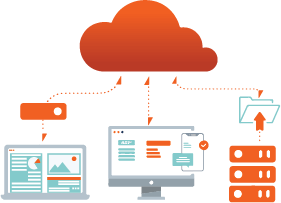
The Guide to MSP Marketing and Sales in 2025
In 2025, MSP marketing is no longer about casting a wide net and hoping for leads – it’s about precision, personalization, and performance. With increased competition, evolving buyer behaviors, and a market flooded with cybersecurity concerns, MSPs must embrace agile marketing and sales strategies to win and retain clients. Plus, with projected 2025 growth for the MSP market in the double digits, you want a piece of that action, right?
But MSPs don’t need to go it alone. Axcient is here to help! With MSP-specific sales and marketing resources, MSPs can engage prospects faster, streamline campaigns, and ultimately drive more revenue. These strategies aren’t rooted in finding the best marketing agency or inflating your sales team – they’re about leveraging the people, clients, products, and vendors you have now to elevate your approach in the market.
Whether you’re a marketing pro or just getting started, this post will guide you through our easy-to-digest and implement resources that can turn your marketing and sales goals into measurable growth.
MSP Marketing and Sales Guide
4 Ways to Grow Your Business as the market continues to grow and marketing and sales techniques evolve.
Table of Contents
The State of MSP Marketing and Sales in 2025
Today’s SMB buyers are more informed, cautious, and demanding than ever before. They aren’t just looking for IT support. They want a cybersecurity-focused partner who can proactively defend their business, reduce risk, and ensure business continuity and disaster recovery (BCDR). Modern SMBs operate in a high-stakes environment where ransomware attacks, compliance violations, and operational downtime can devastate the business overnight. As a result, they’re seeking MSPs that offer the following:
- Security-first solutions: Clients want proof that your solutions can prevent, detect, and recover from cyber threats.
- Demonstrated compliance expertise: Businesses expect MSPs to help them maintain regulatory compliance and meet cyber insurance demands, especially in heavily regulated industries.
- Proactive support and transparency: SMBs want providers who are strategic advisors, not just technical troubleshooters. Reactive IT is no longer acceptable.
- Clear communication and predictable pricing: SMBs value simplicity and clarity, making confusing service tiers or unclear contracts a deal-breaker.
With these elevated expectations, MSPs must build trust and credibility before making the first sales call. To meet these demands, MSPs need marketing and sales strategies that are…
- Consistent, to stay top of mind.
- Educational, to build authority.
- Aligned with sales to accelerate the pipeline.
- Differentiated, to rise above the noise.
Unfortunately, that can be easier said than done.
The Challenges MSPs Face
In 2025, MSPs are navigating a crowded, fast-moving market where every provider claims to offer the best in backup, cybersecurity, and compliance. Standing out requires more than listing technical features. It demands straightforward, compelling storytelling that connects solutions to tangible business outcomes. As you know, most MSPs are small teams focused on service delivery, not full-time marketing. Without dedicated resources, campaigns stall, content goes unwritten, and promising leads slip away.
Even when marketing efforts do get off the ground, they’re often disconnected from sales, leading to inconsistent messaging and missed opportunities. At the same time, MSPs must find ways to prove the value of invisible services like cybersecurity, which can be difficult to communicate without strong client-facing materials. To stay competitive, MSPs must also keep up with changing buyer preferences, content formats, and technology trends, which can be nearly impossible without a partner or platform that understands the unique challenges of marketing-managed services.
So, why not let Axcient help?
Ready to Boost Margins Without Raising Prices?
The MSP Profit Playbook: 5 Ways to Win the Margin Game is an MSP guide to unlocking higher profits through smarter, more strategic operations. It reveals five actionable strategies designed to help MSPs streamline operations, optimize BCDR delivery, and enhance client value while consistently growing margins.
Of course, if you think you’re already maximizing your margins with your BCDR services, take the MSP Profit Margins Quiz to see how you score. There may be more left on the table than what you’re taking advantage of.
Get the Playbook to learn how to:
- Bundle services to reduce overhead and increase client value.
- Right-size client infrastructure from the start for efficiency and ROI.
- Sell the value of your vendor partnerships as a competitive value.
- Leverage upgrades and innovations to deepen client trust.
- Foster collaboration across teams to improve outcomes and reduce friction.
>> Download Now: The MSP Profit Playbook
Want to Drive Sales and Differentiate Your MSP?
The MSP Blueprint for Profitably Selling Bundled Services is a must-read for MSP leaders looking to align sales, marketing, and technical operations around a proven strategy for margin growth. In today’s competitive market, selling cybersecurity and data protection is more than just offering backup. You have to deliver value in a way that’s easy for clients to understand and trust. This eBook helps MSPs do just that by outlining a step-by-step framework for the following:
- Creating compelling BCDR bundles that align with real SMB needs and security standards.
- Simplifying your stack by consolidating tools and vendors for easier service delivery and increased profitability.
- Empowering sales and marketing teams with messaging highlighting your MSP’s security-first commitment.
- Overcoming client objections with transparent education and value-driven communication.
>> Download Now: The MSP Blueprint for Profitably Selling Bundled Services
How About Unlocking Sales Growth One QBR at a Time?
Quarterly business reviews (QBRs) are one of the most powerful tools in your MSP marketing and sales toolkit. The QBR Handbook for MSPs is your playbook for transforming routine client check-ins into meaningful growth opportunities.
This actionable guide walks you through the four Rs of QBR success: relationships, retention, revenue, and reporting. Learn how to strengthen client loyalty, highlight your MSP’s value, introduce upsell opportunities, and use simple yet strategic reporting to show why your services are worth every penny.
Inside the handbook, you’ll discover:
- How to make QBRs consultative strategy sessions that drive renewals and referrals.
- Sales tactics to position bundled services and increase monthly recurring revenue (MRR).
- Ready-to-use metrics and templates for client-facing executive summary reports.
- Automation tips to streamline reporting and make QBR preparation less time-consuming.
>> Download Now: The QBR Handbook for MSPs
Or Do You Want to Expand Your MSP Without Blowing Your Budget?
If your MSP excels at IT but struggles with sales and marketing, you’re not alone or out of options. The MSP Marketing and Sales Guide: 4 Ways to Grow Your Business on a Budget contains the simple and straightforward framework necessary to leverage the low-hanging fruit of MSP marketing and sales. These simple yet strategic tricks teach you how to develop a proactive sales and marketing presence among buyers inundated with different options in a crowded market.
Stand out without breaking the bank:
- How to host impactful webinars and lunch & learns that drive ROI with both prospects and current clients.
- Tips to turn LinkedIn and social media into lead-generation engines, even with minimal time and resources.
- Strategies to build a referral program that turns happy clients into active promoters of your services.
- Upsell and cross-sell techniques that focus on protecting client data while boosting your margins.
>> Download Now: MSP Marketing and Sales Guide
Start Marketing Smarter with Axcient
In a world where MSP marketing is both more competitive and critical than ever, leveraging the right resources can make all the difference. Axcient is committed to helping MSPs market smarter – not harder – with proven strategies and ready-made assets that generate results. Visit the Resources Hub anytime to find more free information tailored just for MSPs and their SMB clients. Whether you’re an Axcient partner or not, we’ve got your back!
Author
Related posts
8 Tips for Optimizing Your Disaster Recovery Strategy
If disaster strikes, how will your organization respond?

How well could you sleep with reliable cloud-based backups and recovery?
Take a deep dive into Axcient’s proprietary, automated security features to see how we’re ensuring uninterrupted business continuity — no matter what:



